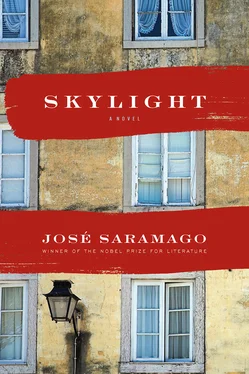Slowly, Isaura’s hands moved toward her sister. Her fingertips could feel the heat of Adriana’s body from a centimeter away. They stayed there for several long minutes, neither advancing nor retreating. The sweat had dried on Isaura’s forehead, but her face was scalding hot as if a fire were burning inside her. Her fingers advanced until they touched Adriana’s bare arm, then withdrew as if they had received an electric shock. Isaura’s heart was beating dully. Her wide, dilated eyes could see nothing but blackness. Again her hands advanced. Again they stopped. Again they moved forward. Now they were resting on Adriana’s arm. With a slithering, sinuous movement, Isaura moved closer to her sister. She could feel the heat emanating from her body. Slowly, one of her hands ran along Adriana’s arm from wrist to shoulder, where it slipped in beneath her hot, damp armpit and insinuated itself beneath one breast. Isaura’s breathing became rapid and irregular. The hand slid beneath the light fabric of Adriana’s nightdress as far as her stomach. Adriana turned abruptly onto her back. Her bare shoulder was on the same level as Isaura’s mouth, which sensed the proximity of flesh. Like iron filings drawn to a magnet, Isaura’s mouth fixed itself on Adriana’s shoulder. It was a long, fierce, hungry kiss. At the same time, her hand grabbed Adriana’s waist and drew her closer. Adriana woke with a start. Isaura did not release her grip. Her mouth was still planted on her shoulder like a sucker and her fingers fastened on her thigh like claws. With a cry of terror, Adriana pulled away and leapt out of bed. She ran to the bedroom door, then, remembering that her mother and aunt were sleeping on the other side, turned back, taking refuge by the window.
Isaura had not moved. She tried to pretend she was asleep, but Adriana still did not come back to bed. She could hear her sibilant breathing. Through half-closed lids, she could see her sister’s body silhouetted against the opalescent backdrop of the window. Then, abandoning all pretense at sleep, she said softly:
“Adriana.”
Her sister’s tremulous voice answered:
“What do you want?”
“Come here.”
Adriana did not move.
“You’ll get cold,” insisted Isaura.
“It doesn’t matter.”
“You can’t stay there. If you don’t come over here, I’ll come to you.”
Adriana approached, sat down on the edge of the bed and reached out to turn on the light.
“Don’t,” said Isaura.
“Why not?”
“I don’t want you to see me.”
“Why ever not?”
“I’m ashamed…”
These words were spoken in a murmur. Adriana’s voice was becoming firmer, but Isaura’s trembled as if she were about to break into sobs:
“Please, I beg you, lie down…”
“No, I won’t.”
“Why? Are you afraid of me?”
Adriana took a while to answer:
“Yes, I am…”
“I won’t do anything, I promise. I don’t know what came over me. I swear…”
Isaura began to cry softly. Adriana opened the wardrobe door and, by touch alone, found a woolen jacket. She put it on and sat down again at the foot of the bed.
“Are you going to stay there?” asked her sister.
“Yes.”
“All night?”
“Yes.”
Isaura let out a louder sob. Almost immediately, the light in the room next door came on and they heard Amélia say:
“Is something wrong?”
Adriana quickly stuffed her jacket behind the bed and slipped beneath the sheets. Amélia appeared in the doorway, a shawl wrapped about her shoulders.
“What is it?”
“Isaura had a bad dream,” said Adriana, sitting up in order to hide her sister.
Amélia came closer:
“Are you ill?”
“It’s nothing, Aunt. It was just a nightmare. Go back to bed,” said Adriana, pushing her away.
“All right, but if you need anything, just call.”
The bedroom door closed again, the light went out, and silence gradually returned, broken only by a few muffled sobs. Then the sobs became fewer and farther between, and only the shaking of Isaura’s shoulders betrayed her agitation. Adriana kept her distance, waiting. Slowly the sheets grew warm again. The warmth from their two bodies mingled. Isaura said:
“Do you forgive me?”
Adriana did not respond at once. She knew that she should say yes, in order to reassure Isaura, but the word she wanted to say was an abrupt no.
“Do you forgive me?” Isaura asked again.
“Yes, I forgive you.”
Isaura felt an impulse to embrace her sister and weep, but she controlled herself, fearing that Adriana might misinterpret the gesture. She felt that, from then on, everything she did or said would be poisoned by the memory of those few minutes, that her love for her sister had been distorted and soiled by that terrible bout of insomnia and by what had followed. Breathlessly, she murmured:
“Thank you.”
The minutes and hours passed very slowly. The clock downstairs chimed at regular intervals, measuring out the time as if it were an endless skein of wool. Isaura finally fell asleep, exhausted. Adriana did not. She remained awake until the bluish light of night filling the window had become the gray light of dawn, which, in slow gradations, was replaced by the white light of morning. Motionless, staring up at the ceiling, her head pounding, she was obstinately struggling with the awakening of her own hunger for love, which was equally repressed, hidden and frustrated.
That evening, in Anselmo’s apartment, they dined earlier than usual. Maria Cláudia had to get dressed up in order to be introduced to Paulino Morais, and it was best not to keep a person waiting when you were planning to ask him a favor. Mother and daughter had eaten quickly, then disappeared into the latter’s bedroom. There were various problems to resolve as how best to present Claudinha, and the most difficult of all was what to wear. None of her dresses set off her beauty and her youth better than a yellow sleeveless number in a light, airy fabric. When she turned, its full, gathered skirt resembled an inverted flowerhead and fell languidly from her waist like a lazy wave. This won Rosália’s vote; however, Claudinha, with her natural good sense and good taste, realized that while the dress would be ideal for the summer months, it looked out of place in a still-rainy spring. Besides, Senhor Morais might disapprove of its not having sleeves. Rosália agreed, but made no further suggestions. She had chosen that dress and that alone, and had no other preferences.
The choice was not easy, but in the end Claudinha plumped for a gray-green dress, which was discreet and appropriate for the season. It was a woolen dress, with long sleeves that fastened at the cuffs with buttons of the same gray-green color. It had a modest neckline that barely revealed her throat. For a future employee it was perfect. Rosália disagreed, but as soon as her daughter put the dress on, she saw that she was right.
Maria Cláudia was always right. She studied herself in the wardrobe mirror and liked what she saw. The yellow dress made her look younger, but what she wanted now was to look older. No frills, no bare arms. The dress she had chosen fitted her like a glove, seemed to cling to her body and respond to her slightest movement. It had no belt, but the cut of the dress gave it a natural waist, and Maria Cláudia’s waist was so slender anyway that a belt would spoil the effect. Seeing herself in the mirror, Claudinha realized which direction she should take in future as regards what she wore. No frills and fripperies to hide her figure. And at that moment, turning this way and that in front of the mirror, it occurred to her that she would look good in a lamé dress, the kind that resembles a second skin, as flexible and supple as her own.
Читать дальше












